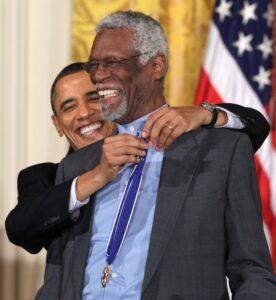
By Jessica Johnson, For The African-American Athlete
Throughout the course of LeBron James’ legendary NBA career, he has consistently drawn comparisons to Michael Jordan when debates are raised about the greatest ever to play the game. When James had to address the racist incident of slur-filled graffiti sprayed on the gates of his Los Angeles home before taking the court against Golden State in Game 1 of the NBA Finals, there was another renowned player he instantly reminded me of: Bill Russell.
During his early years with the Boston Celtics, Russell had a similar racist experience when some residents in Beantown did not welcome him with open arms shortly after he purchased a home. In the 1996 HBO Sports documentary “The Journey of the African-American Athlete,” former Celtic teammate Don Chaney shared the story of how trash was thrown on Russell’s lawn in addition to people calling Russell’s home spewing racial insults. Once they found out that Russell was the star center for the Celtics, then the customary house-warming gifts of “cookies and flowers” arrived. Chaney believed Russell was especially hurt since Russell knew his neighbors only relented in their bigotry because he was a professional athlete.
Reading about the vandalizing of James’ home, you would think it was 1957 — the year Russell helped lead the Celtics to their first championship — instead of 2017. Enough time has passed for two generations to come of age since Russell got his first ring, and yet this blatant display of hate toward James is another stark reminder that racism has never been completely dormant in our country. When James said that “no matter how much money you have, no matter how famous you are, no matter how many people admire you … being black in America is tough,” this was reminiscent of a similar interview Russell did with the press in the 1960s that was highlighted in “The Journey.” Russell said that you could take “22 million Negroes” in the United States and give all of them $1 million and nothing would change. When the reporter asked why, Russell unapologetically responded, “It’s about people.”
James clearly understands that whoever sprayed the n-word on his gates thinks of him in this derogatory manner despite the fact that he’s well on his way to becoming a billionaire. He briefly talked about the gruesome murder of Emmett Till as one example of the disgraceful history of American racism, although James was in no way comparing what took place at his home to the atrocious torture Till suffered at the hands of depraved and sadistic men in the Mississippi Delta in 1955. But, sadly, there are plenty of disturbing current cases and tragedies James could have used.
He could have mentioned the nooses found recently at the National Museum of African American History and Culture. He could have mentioned the May 20 murder of Richard Collins III on the University of Maryland campus. Collins, a young black man who was second lieutenant in the U.S. Army, had been visiting friends that weekend and was set to graduate from Bowie State University the following Tuesday. His life was brutishly cut down when he was stabbed by Sean Urbanski, a white Maryland student who reportedly has alt-right ties. The FBI is investigating Collins’ murder as a hate crime.
Los Angeles Police Department detectives are looking into the James’ incident as a hate crime, and James knows that his celebrity status as an elite athlete does not separate him from the racial hatred and fear that has been a distressing part of the black experience in America. He has not shied away from speaking out on social activist issues, and the desecration of his property might usher James into a more prominent role. The stand that James took regarding the deaths of Trayvon Martin and Eric Garner is well known, but this time it’s personal. During his press conference, it was evident that James was deep in thought about the implications of this crime and its effects on his family.
He said that we have a long way to go “for us as a society” and “for us as African-Americans until we feel equal.” The essential point here is feel equal, which I’m sure Russell would still maintain “It’s about people.”
You can reach Jessica A. Johnson at johnson.503@osu.edu @JjSmojc


